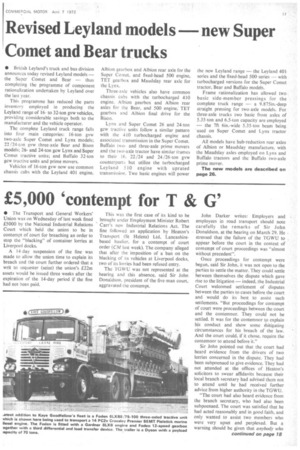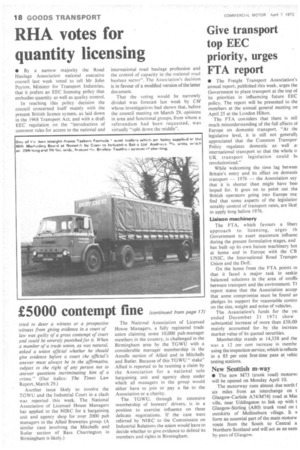0,000 'contempt for T
Page 19

Page 20

If you've noticed an error in this article please click here to report it so we can fix it.
• The Transport and General Workers' Union was on Wednesday of last week fined £5000 by the National Industrial Relations Court which held the union to be in contempt of court for breaching an order to stop the "blacking" of container lorries at Liverpool docks.
A 14-day suspension of the fine was made to allow the union time to explain its breach and the court further ordered that a writ to sequester (seize) the union's £22m assets would be issued three weeks after the expiration of the 14-day period if the fine had not been paid.
This was the first case of its kind to be brought under Employment Minister Robert Carr's new Industrial Relations Act. The fine followed an application by Heaton's Transport (St Helens) Ltd, Lancashirebased haulier. for a contempt of court order (CM last week). The company alleged that after the imposition of a ban on the blacking of its vehicles at Liverpool docks, two of its lorries had been refused entry.
The TGWU was not represented at the hearing and this absence, said Sir John Donaldson. president of the five-man court, aggravated the contempt.
John Darker writes: Employers and employees in road transport should note carefully the remarks of Sir John Donaldson, at the hearing on March 29. He stressed that the failure of the TGWU to appear before the court in the context of contempt of court proceedings was "almost without precedent".
Once proceedings for contempt were begun, said Sir John, it was not open to the parties to settle the matter. They could settle between themselves the dispute which gave rise to the litigation — indeed, the Industrial Court welcomed settlement of disputes between the parties to cases before the court and would do its best to assist such settlements. "But proceedings for contempt of court were proceedings between the court and the contemnor. They could not be settled. It was for the contemnor to explain his conduct and show some tinitigating circumstances for his breach of the law. And the court could, if it chose, require the contemnor to attend before it."
Sir John pointed out that the court had heard evidence from the drivers of two lorries concerned in the dispute. They had been subpoenaed to give evidence. They had not attended at the offices of Heaton's solicitors to swear affidavits because their local branch secretary had advised them not to attend until he had received further advice from higher authority in the TGWU.
"The court had also heard evidence from the branch secretary, who had also been subpoenaed. The court was satisfied that he had acted reasonably and in good faith, and only wanted to assist two members who were very upset and perplexed. But a warning should be given that anybody who tried to deter a witness or a prospective witness from giving evidence in a court of law was guilty of a gross contempt of court and could be severely punished for it. When a member of a trade union, as was natural, asked a union official whether he should give evidence before a court the official's answer must always be in the affirmative, subject to the right of any person not to answer questions incriminating him of a crime" (Our italics: The Times Law Report, March 29.) Another issue likely to involve the TGWU and the Industrial Court in a clash was reported this week. The National Association of Licensed House Managers has applied to the NIRC for a bargaining unit and agency shop for over 2000 pub managers in the Allied Breweries group. (A similar case involving the Mitchells and Butler section of Bass Charrington in Birmingham is likely.) The National Association of Licensed House Managers, a fully registered trade union claiming some 10,000 pub-manager members in the country, is challenged in the Birmingham area by the TGWU with a considerable manager membership in the Ansells section of Allied and in Mitchells and Butler. Because of this TGWU stake" Allied is reported to be resisting a claim by the Association for a national sole bargaining unit and agency shop under which all managers in the group would either have to join or pay a fee to the Association or a charity.
The TGWU, through its extensive membership of brewers' drivers, is in a position to exercise influence on these delicate negotiations. If the case were referred by N1RC to the Commission on Industrial Relations the union would have to decide whether to give evidence to defend its members and rights in Birmingham.




















































































